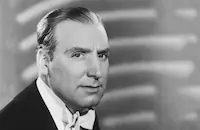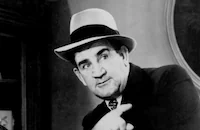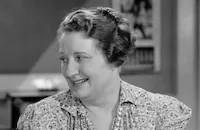Curtain Call

Brief Synopsis
Cast & Crew
Frank Woodruff
Barbara Read
Alan Mowbray
Helen Vinson
Donald Macbride
John Archer
Film Details
Technical Specs

Synopsis
Broadway producing team Jeff Crandall and Donald Avery resort to desperate measures when threatened with the loss of their one asset, tempermental star Charlotte Morley, who has begun contract negotiations with a rival producer. With only one remaining show on her contract with Crandall and Avery, the producers try to convince her to stay with the company, but she refuses. Hoping to blackmail the actress into signing a new contract by forcing her to play in the worst play they can find, the producers buy the ghastly first play written by country girl Helen Middleton. Helen's play is a tragedy appropriately titled The End of Everything . Their plan backfires, however, when the star professes that the tragedy is the greatest play she has ever read and she is eager to act in it. Faced with the dilemma of producing the opus at a cost of $30,000 and thereby ruining their careers, or paying the star $50,000, of which they are short $49,999, for failure to live up to their contract, the pair set out to win permission to rewrite the play. Meanwhile, Helen, overjoyed by her instant success, bids farewell to her hometown of Medbury, refuses her sweetheart Ted Palmer's proposal of marriage, and journeys to New York to begin her new career. Helen, at the strong urgings of Charlotte, refuses their request to tamper with the script, so Crandall instructs Avery to romance Helen, hoping that she will fall in love with him and give in to his demands. The plan fails, but Crandall's secretary discovers that the work may be re-written according to a certain previously unnoticed clause in Helen's contract. Meanwhile, Ted arrives in New York to try to convince Helen to marry him, but she sends him away. When the play goes into rehearsal, the leading actor complains about the terrible dialogue, and Avery, in a fit of anger, tells Helen how bad her play is. Upset, Helen runs away and hides in a cheap hotel until opening night. During her absence, Avery rewrites the play, and when it opens, it becomes an instant hit as a comedy. All ends happily when the disillusioned Helen decides that she prefers a home and marriage to the glamour of the Broadway stage, and returns to Medbury with Ted.

Director
Frank Woodruff
Cast
Barbara Read

Alan Mowbray

Helen Vinson

Donald Macbride

John Archer

Leona Maricle
Frank Faylen

Tom Kennedy

Ralph Forbes

J. M. Kerrigan

Ann Shoemaker
Tommy Kelly
Crew
Howard Benedict
John L. Cass
Albert D'agostino
Howard J. Green
Millard Kaufman
Lee Marcus
Harry Marker
Russell Metty
Van Nest Polglase
Renié
Dewey Starkey
Roy Webb

Film Details
Technical Specs

Articles
Curtain Call -
By Richard Harland Smith

Curtain Call -
Quotes
Trivia
Notes
This film marked the Hollywood debut of radio and stage director Frank Woodruff. The picture also marked producer Howard Benedict's first film for RKO. According to the file for the film in the MPAA/PCA Collection at the AMPAS Library, RKO was warned by the PCA to "take care with the 'fancy gyrations'" of the jitterbug dance in the film.














